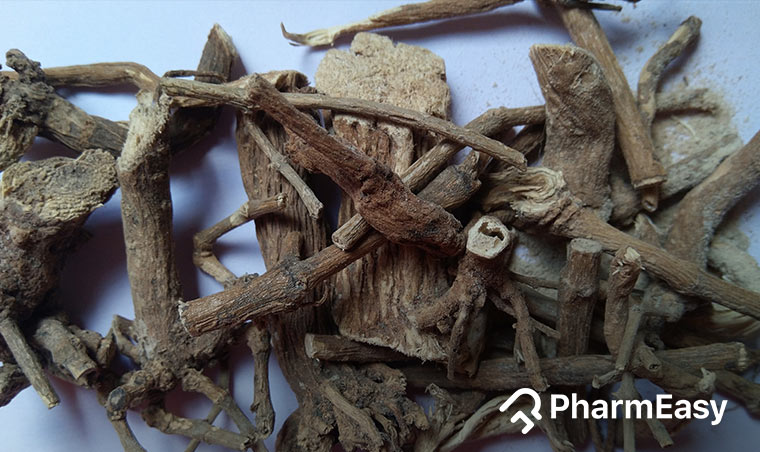Sarpagandha (Indian Snakeroot): Uses, Benefits, Side Effects, Precautions & More!
By Dr Rajeev Singh +2 more

Get,

to manage your symptom
Get your,


4 Cr+ families
benefitted

OTP sent to 9988776655



You’ve successfully subscribed to receive
doctor-approved tips on
Whatsapp

Get ready to feel your best.

Hi There,
Download the PharmEasy App now!!


Register to Avail the Offer
Send OTPBy continuing, you agree with our Privacy Policy and Terms and Conditions

Hi There,
Sign up on PharmEasy now!!
Trusted by 4 crore+ families

OTP sent to 9988776655



You have unlocked 25% off on medicines




Code: NU25
By Dr Rajeev Singh +2 more
Table of Contents
Sarpagandha Ghan Vati is an Ayurvedic medicine derived from sarpagandha, a valuable root obtained from the flowering plant, Rauwolfia serpentina1. In Sanskrit, sarpagandha refers to snakeroot as the plant’s root is twisted and resembles a snake. The root of this plant is used in folk and tribal medicine. Alkaline reserpine is a compound produced by sarpagandha which may have beneficial effects on the human body.

Do You Know?
Rauvolfia serpentine roots, the Indian snakeroot, devil’s pepper, or serpentine wood (Sarpagandha). Alkaline reserpine obtained from the plant is the principal active component4. Sarpagandha is also known to have many beneficial properties. These include
Over the years, I have observed that Sarpagandha might have certain properties known as Ushna Virya and Tikta Guna. These properties suggest that it could act as an appetizer, digestive aid, cholagogue (stimulates bile flow), and anthelmintic (expels worms)14.
Dr. Rajeev Singh, BAMS
From ancient times, serpentina roots, and juice have been thought to have properties, attract the attention of physicians. The roots of this plant are rich in reserpine alkaloid4.

The powder derived from Sarpagandha roots may help as a natural remedy for treating hypertension. In studies it was found that sarpagandha may lower blood pressure and it may have some effect on blood circulation it may have effect on nerve function in the muscles that lead to the heart6. These properties studied in sarpagandha may indicate its benefits for blood pressure and heart health but these studies are insufficient. You must take advice from a qualified doctor before using sarpagandha for its benefits.

Sarpagandha may be beneficial in the treatment of anxiety symptoms. As per Ayurveda, Vata is responsible for all body movements and nervous system processes. An imbalance in Vata is the primary cause of anxiety. Since sapagandha may have vata-balancing properties, it may help with improving anxiety symptoms6.

People have trouble sleeping even after a tiring day when they have insomnia. A disturbed vata-dosha, according to Ayurveda, disrupts the nervous system, resulting in insomnia. Sarpagandha’s sleep-inducing properties may be helpful to calm the nervous system and it may promote restful sleep. When combined with other ingredients, sarpagandha has been studied to be effective in the management of insomnia7.
However, the studies available seem to be insufficient to validate its effect on humans. Consult your doctor for treatment of insomnia.

Sarpagandha may have properties that help in reducing fever. Studies have reported that sarpagandha exhibits some laxative properties that help in relieving constipation and it may have some effect on digestion. ‘Ama’ in Ayurveda, is a toxin that persists in the body because of improper digestion. Ama may cause fever in the body. Sarpagandha may have certain properties called ‘ushna’ that may help with reducing fever6. Contact your doctor for advice for digestive problems and specially if it leads to fever.

Sarpagandha may be used to treat various skin problems like boils and acne. It is traditionally used in various places across India for treating scabies7. This effect of sarpangandha on the skin may need more studies to establish its efficacy. You must consult a dermatologist for advice on skin problems.
Also Read: 16 Home Remedies for Glowing Skin

Though there are studies that show the benefits of sarpagandha in various conditions, these are insufficient and there is a need of further studies to establish the true extent of the benefits of sarpagandha on human health.
Sarpagandha is available in three forms6,9:
Your Ayurvedic physician will prescribe you the form and dosage as per your health condition.
You must consult a qualified doctor before taking any herbal supplements. Do not discontinue or replace an ongoing treatment of modern medicine with an ayurvedic/herbal preparation without consulting a qualified doctor.
The most common side effects of sarpagandha may include nasal congestion (nose block) and dryness of the mouth. Some other reported side effects are10:
However, if you experience any of these adverse reactions to sarpagandha, immediately contact a doctor or your Ayurvedic physician who has prescribed it to you. They will be able to guide you appropriately for your symptoms.
Based on my experience, I have observed that larger doses of Sarpagandha may show some side effects to be aware of. These can include low libido and weight gain. It is believed that certain compounds in Sarpagandha may affect hormonal balance and metabolism14.
Dr. Siddharth Gupta, B.A.M.S, M.D (Ayu)
Eating sarpagandha may be okay if it is taken in moderate amounts with general precautions. Sarpagandha may have some negative effects on the following conditions8:
Please do not try to treat yourself by consuming herbs. Ayurvedic herbs may have potential benefits, but it is advisable to consult a qualified Ayurvedic physician before taking any herb for its health benefits.
Also Read: Chandraprabha Vati (Chandraprabha Gulika): Uses, Benefits, Side Effects, Precautions & More!
It is essential to keep in mind not to use Sarpagandha with any of these medications11.
It is essential to consult your Ayurvedic physician before consuming any herbs like sarpagandha for its benefits. Your Ayurvedic physician can appropriately modify the dosage and prescribe as per your current medications, conditions, and requirements.
Also Read: Chirata – Uses, Benefits, Side Effects, & Precautions
Sarpagandha contains a chemical compound called reserpine that may help in reducing blood pressure. However, these studies may be insufficient to identify the benefits of sarpagandha for blood pressure in humans. You must always consult your doctor for advice.
Sarpagandha is not only found India, but is also found in Sri Lanka, Pakistan, Thailand and Burma. In India, it is widely found in the sub-Himalayan region in Punjab, Nepal, Bhutan, and Sikkim12 .
Sarpagandha has other names such as Indian snakeroot, Rauwolfia serpentina, snakeroot, snakewood, serpentine, Racine de Serpent, Raudixin, etc9.
If you have kidney disease, you must avoid taking herbal supplements as some herbal products can damage your kidneys and potentially worsen the condition. Some herbal medicines may contain aristolochic acid, which can harm your kidneys12.
Sarpagandha is used to treat stomach and intestinal ulcers. It can also be used in the treatment of ulcerative colitis10. But further studies are needed to understand its actual potential for human health.
Anti-oxidants are compounds that can help to prevent or delay cell damage. The leaves of Indian snakeroot have anti-oxidant properties7.
Sarpagandha can be used to relieve itchy skin and is also used in the treatment of urticaria13.
Also Read: Amaltas – Uses, Benefits, Side Effects and Precautions
Disclaimer: The information provided here is for educational/awareness purposes only and is not intended to be a substitute for medical treatment by a healthcare professional and should not be relied upon to diagnose or treat any medical condition. The reader should consult a registered medical practitioner to determine the appropriateness of the information and before consuming any medication. PharmEasy does not provide any guarantee or warranty (express or implied) regarding the accuracy, adequacy, completeness, legality, reliability or usefulness of the information; and disclaims any liability arising thereof.
Links and product recommendations in the information provided here are advertisements of third-party products available on the website. PharmEasy does not make any representation on the accuracy or suitability of such products/services. Advertisements do not influence the editorial decisions or content. The information in this blog is subject to change without notice. The authors and administrators reserve the right to modify, add, or remove content without notification. It is your responsibility to review this disclaimer regularly for any changes.
Comments

Leave your comment...
You may also like
Comments